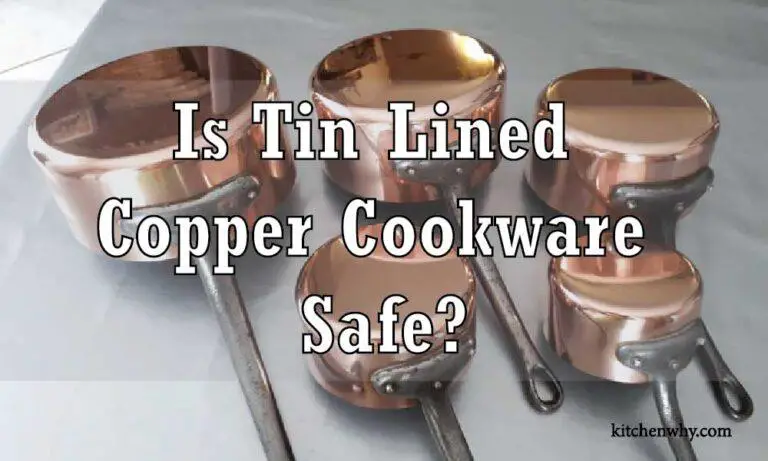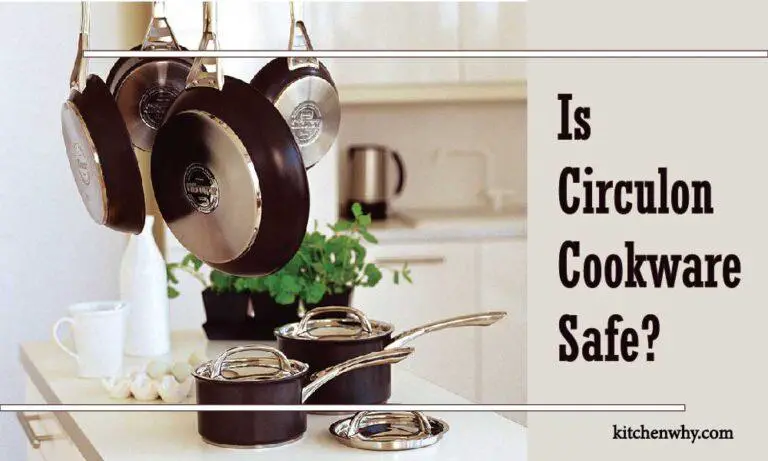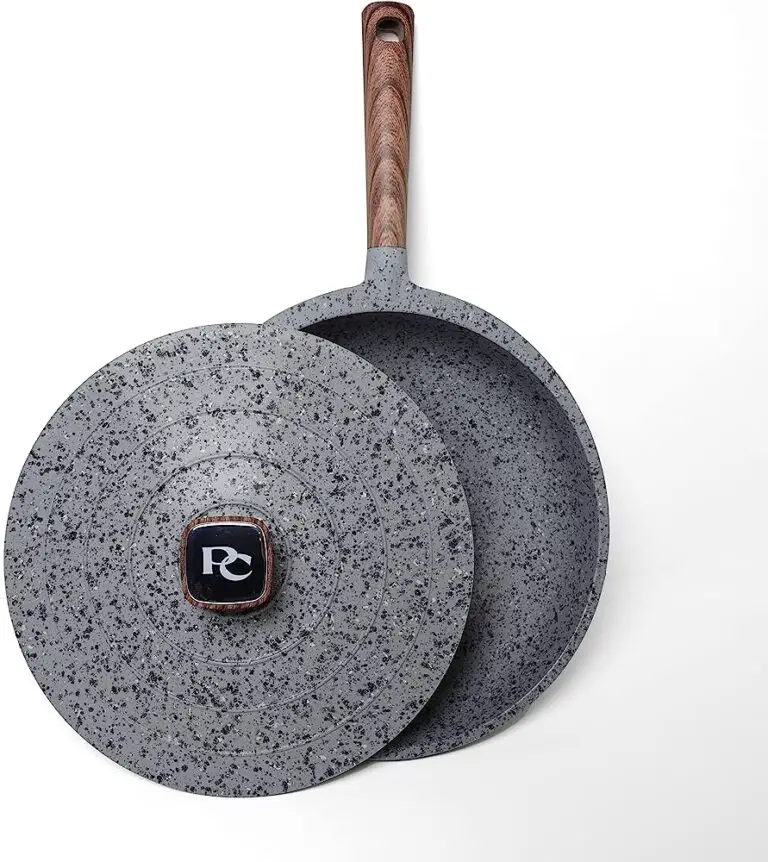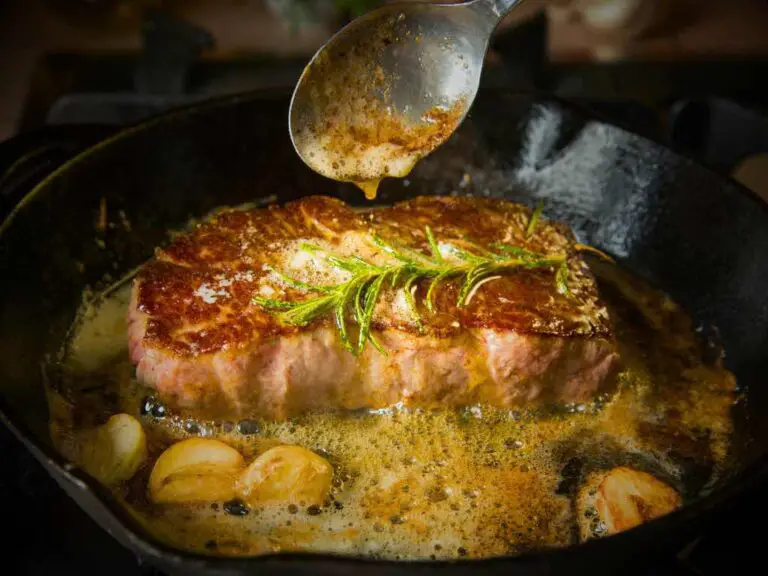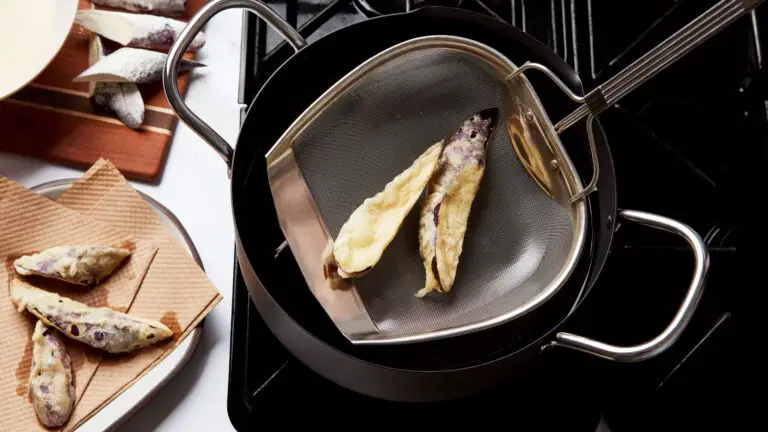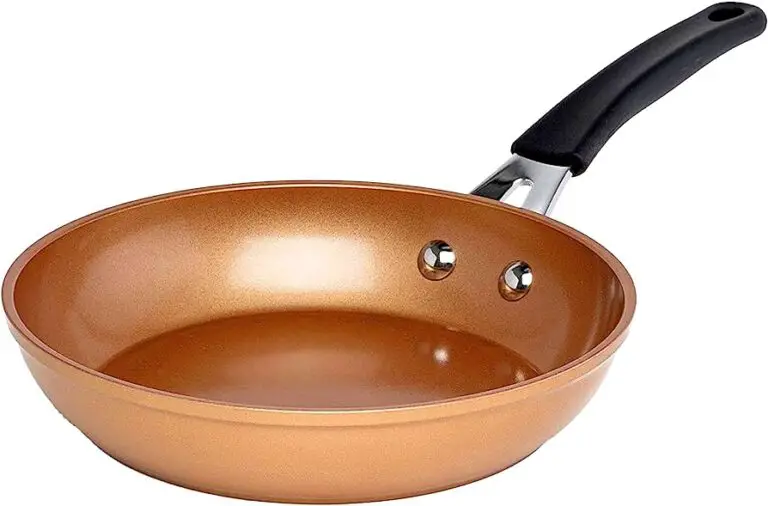Is Surgical Steel Cookware Safe? Get the Facts.

This post will answer the question, Is Surgical Steel Cookware Safe? It will review the safety of stainless steel cookware, how to properly care for Surgical Steel Cookware Safe, and what brands are safe to buy.
Surgical steel cookware is generally considered safe for cooking and food consumption. Surgical steel is a type of stainless steel that is often used in medical and surgical equipment due to its non-reactive and durable properties.
It is also commonly used in cookware due to its ability to resist corrosion and its non-porous surface that prevents the absorption of bacteria and flavors. However, not all surgical steel cookware is created equal and some may contain other metals or chemicals that could be harmful.
It is important to research and choose reputable brands that use high-quality surgical steel and adhere to strict safety standards. In general, using surgical steel cookware for cooking and food consumption is considered safe and can be a healthy option for meal preparation.
Is Surgical Steel Cookware Safe to Use?
Surgical steel cookware is generally considered safe to use for cooking purposes. Surgical steel is a type of stainless steel that is highly resistant to corrosion and staining, making it a popular choice for medical instruments and implants. It is also used in cookware due to its durability, heat resistance, and non-reactive properties.
Here are some reasons why surgical steel cookware is considered safe:
- Non-reactive: Surgical steel is non-reactive, meaning it does not interact with acidic or alkaline foods during cooking. This property ensures that no metallic substances leach into your food, preserving its taste and quality.
- Durability: Surgical steel is highly durable and resistant to scratches, dents, and warping. This makes it suitable for everyday cooking and ensures that there are no particles or flakes that could contaminate your food.
- Corrosion resistance: Surgical steel has excellent corrosion resistance, which means it does not rust or tarnish easily, even with prolonged exposure to moisture or acidic ingredients.
- Heat distribution: Surgical steel cookware often has good heat distribution properties, allowing for even cooking and preventing hot spots that can lead to unevenly cooked food.
- Easy to clean: Surgical steel is typically easy to clean and maintain. It is dishwasher safe in most cases, although handwashing is generally recommended to maintain the longevity of the cookware.
While surgical steel cookware is generally safe, it’s important to note that the quality and composition of cookware can vary among manufacturers. It’s advisable to purchase cookware from reputable brands and ensure that it meets industry standards and certifications for safety and quality.
Understanding Surgical Steel Cookware
Cookware plays an essential role in our kitchens, and choosing the right one is crucial in ensuring safe and healthy cooking. While there are several types of cookware available in the market, the question often arises: is surgical steel cookware safe?
In this blog, we’ll explore what surgical steel is, its composition, properties, production process, and benefits to help you understand why surgical steel cookware is an excellent choice for your kitchen.
What Is Surgical Steel?
Surgical steel is a type of stainless steel used in the manufacturing of surgical instruments, implants, and medical equipment. It has a unique blend of metals, making it resistant to corrosion, rust, and staining. Surgical steel is also known as medical-grade stainless steel, ensuring high-quality and safe materials.
Composition And Properties
Surgical steel is made of various metals, including chromium, nickel, and molybdenum. These metals are highly durable and strong, providing a sturdy and long-lasting quality to surgical steel cookware. Additionally, surgical steel is non-reactive, meaning it doesn’t leach any harmful components into your food, making it an excellent choice for cooking.
Why Is It Used For Cookware?
Surgical steel is used for cookware because of its durability, non-reactive nature, and resistance to corrosion. It has a high resistance to heat, making it ideal for cooking at high temperatures without worrying about chemical reactions with your food. Moreover, it is easy to clean, hygienic, and does not impart any flavors or odors to your food.
Benefits Of Surgical Steel Cookware
Cooking with surgical steel cookware has several benefits, making it a preferred choice for many home cooks. Some of the benefits include:
- Surgical steel cookware is long-lasting, durable, and doesn’t require frequent replacements, saving you money in the long run.
- It is non-reactive, meaning it doesn’t leach any harmful substances into your food, ensuring safe and healthy cooking.
- Surgical steel cookware is easy to clean, which is a significant factor in maintaining a hygienic kitchen environment.
- It is highly resistant to heat, ensuring even cooking and preventing hotspots, resulting in a better cooking experience.
- Surgical steel cookware is versatile and can be used for various cooking methods, including boiling, steaming, baking, and frying.
How Is Surgical Steel Cookware Made?
The production of surgical steel cookware involves a series of quality control measures to ensure that each piece is of high quality and meets industry standards. The production process includes:
- Smelting: The raw materials are melted and blended to create the desired composition of surgical steel.
- Casting: The molten steel is poured into molds where it solidifies and takes shape.
- Rolling: The cooled steel is then rolled into sheets of the desired thickness.
- Deep drawing: The sheets are trimmed to size and then undergo deep drawing, where they are shaped into the desired cookware item.
- Finishing: The cookware is then polished, cleaned, and inspected to ensure that it meets the desired quality standards.
Surgical steel is a safe and durable material used in the production of cookware. The unique combination of metals provides several benefits, making it an excellent choice for your kitchen. With proper care and maintenance, surgical steel cookware can last for several years, providing safe and healthy cooking for you and your family.
Potential Health Risks Of Cookware Materials
Although many people are concerned about the safety of their cookware, there is no single answer to the question of whether surgical steel cookware is safe. In general, however, the safety of cookware is determined by the materials used in their construction.
Different types of cookware materials carry health risks, so it’s essential to make informed choices when selecting cookware.
Overview Of Common Cookware Materials
Cookware can be made from a variety of materials, including aluminum, stainless steel, cast iron, copper, ceramic, and non-stick coatings. Each material has its strengths and weaknesses, as well as potential health risks.
Comparison Of Stainless Steel, Aluminum, And Non-Stick Coatings
Stainless steel and aluminum are two of the most common materials used to make cookware, while non-stick coatings have become increasingly popular in recent years. While stainless steel and aluminum are generally safe, non-stick coatings may pose health risks due to the chemicals used in their construction.
Health Concerns With Non-Stick Coatings
Many non-stick coatings contain perfluorooctanoic acid (pfoa), a chemical that can release toxic fumes when heated to high temperatures. Long-term exposure to pfoa has been linked to cancer, thyroid disease, and developmental problems. In addition, non-stick coatings can scratch easily, allowing small particles to mix with food and potentially cause health problems.
Chemicals Used And Potential Dangers
Non-stick coatings are made of various chemicals, including pfoa, as well as other chemicals like perfluorohexanoic acid (pfhxa) and perfluorobutane sulfonate (pfbs). These chemicals can leach into food, leading to long-term health effects.
Dangers Of Aluminum Cookware
Unlike stainless steel, aluminum can be reactive with acidic foods, which can cause the metal to leach into the food. This can be hazardous to health, as exposure to high levels of aluminum has been linked to alzheimer’s disease and other health problems.
Exposure To High Levels Of Aluminum And Its Effects On Health
When aluminum accumulates in the body, it can cause neurological damage, which can lead to memory loss, confusion, and other cognitive problems. Long-term exposure to aluminum has also been linked to dialysis dementia and parkinson’s disease.
When considering the safety of cookware, it’s essential to pay attention to the materials used in their construction. While non-stick coatings may offer convenience, they can pose health risks, making it crucial to choose cookware made from safer materials like stainless steel and cast iron.
By making informed choices about cookware, you can maintain a healthy and safe cooking environment.
Exploring The Safety Of Surgical Steel Cookware
Pfoa And Ptfe-Free
Surgical steel cookware is a popular option for many households due to its durability, longevity, and resistance to corrosion. One of the advantages of surgical steel cookware is that it is often PFOA and PTFE-free. What does this mean?
- PFOA (perfluorooctanoic acid) and PTFE (polytetrafluoroethylene) are synthetic chemicals used in the manufacturing of nonstick surfaces.
- PFOA has been linked to health issues such as cancer, infertility, and liver damage.
- Ptfe can release toxic gases if heated above 500°f, causing flu-like symptoms in humans and death in birds.
- Pfoa and ptfe-free cookware is a safer option for both human health and the environment.
Explanation Of The Two Chemicals And Their Potential Harms
PFOA and PTFE are added to nonstick surfaces to prevent food from sticking and make cleanup easier. However, these chemicals are not without their hazards:
- PFOA is a toxic chemical that accumulates in our bodies and the environment.
- Pt-coated pans can release toxic fumes when overheated, which can be dangerous to humans and pets.
- Exposure to both chemicals has been linked to a variety of health issues, including cancer, developmental problems, and liver damage.
Impact On Food And Taste
One of the biggest concerns when using cookware is the impact it has on the food we eat. Here’s what you need to know about surgical steel cookware:
- Surgical steel is a nonreactive metal that does not interact with acidic or alkaline foods, preserving their natural flavors and nutrients.
- Unlike aluminum or copper cookware, which can affect the taste of food, surgical steel does not impart any metallic taste to your dishes.
- Food cooked in surgical steel maintains its original color, texture, and taste, making it a popular choice among professional chefs.
Does Surgical Steel Affect The Taste Of Food?
No, surgical steel does not affect the taste of food. It is a nonreactive metal that does not interact with acidic or alkaline foods, preserving their natural flavors and nutrients. Unlike aluminum or copper cookware, which can react with certain types of food, surgical steel does not impart any metallic taste to your dishes, ensuring that they taste exactly as they should.
Effectiveness Of Surgical Steel
Whether you’re a professional chef or just looking for cookware that delivers consistent results, surgical steel is a great choice. Here are some benefits of using surgical steel cookware:
- Surgical steel heats up quickly and evenly, preventing hot spots and ensuring that your food is cooked to perfection.
- Its smooth surface prevents food from sticking, making it easy to flip, turn, and remove your dishes from the pan.
- Surgical steel cookware is durable and long-lasting, making it an investment that will last you for years to come.
Can Surgical Steel Cookware Cook Food Evenly And Properly?
Yes, surgical steel cookware can cook food evenly and properly. Its nonreactive surface ensures that food is cooked evenly without any hotspots. The smooth, nonstick surface also ensures that food doesn’t stick or burn, making it easy to flip or remove dishes from the pan.
Additionally, surgical steel heats up quickly and retains heat well, making it an efficient choice for cooking a wide range of dishes. Whether you’re cooking delicate seafood or hearty stews, surgical steel cookware is a versatile, effective option.
How To Properly Use And Care For Your Surgical Steel Cookware
Surgical steel cookware is a popular choice for many home cooks and professional chefs alike due to its durability and non-reactivity properties. With proper care and usage, it can offer many years of safe cooking. However, it is important to keep in mind some tips for using and caring for your surgical steel cookware to ensure its safe and long-term use in your kitchen.
Here is everything you need to know:
Tips For Using Surgical Steel Cookware
- Always preheat the cookware on medium heat before adding the food.
- Avoid using high heat as the cookware can retain heat well and cooking on low heat works efficiently.
- Never use metal utensils to stir or cook in the cookware.
- Be mindful of what types of food you are cooking in your surgical steel cookware, as it can react negatively with acidic foods like tomatoes or lemon juice.
- Try to avoid deep-frying your cookware, as it may cause discoloration and damage to the surface.
Proper Heat And Storage Techniques
- Preheat the pan before use, filling it with water or oil for a few minutes to avoid sticking.
- Always use a potholder when handling hot cookware, as surgical steel cookware can retain heat for a long time.
- Store your cookware in a dry location at room temperature to prevent it from rusting or discoloring.
- Avoid stacking heavy cookware on top of each other as it may scratch and damage the surface.
Important Cleaning And Maintenance Tips
- After use, let the cookware cool down completely before cleaning it with warm soapy water.
- Avoid using abrasive cleaning products or steel wool, which can scratch the surface of your cookware.
- Clean your cookware with a soft sponge or a cloth to avoid damaging the surface.
- Dry the cookware immediately after washing it to prevent water spots and rust from forming on the surface.
Avoid Using Abrasive Cleaning Products And Techniques
- Never use harsh, abrasive cleaning products or steel wool to clean your surgical steel cookware.
- Stay away from using abrasive cleaning brushes and other abrasive materials, as they can scratch and damage the surface.
When To Replace Your Cookware
- If you notice any signs of rust, warping, or discoloration, it’s time to replace your cookware.
- Check for any scratches or cracks that can affect the cookware’s safety and performance.
Remember, proper care and use of your surgical steel cookware can ensure its long-lasting use and safety in your kitchen. By following these tips, you can enjoy safe and healthy cooking every day.
Frequently Asked Questions Of Is Surgical Steel Cookware Safe?
What Is Surgical Steel Cookware Made Of?
Surgical steel is an alloy made of various metals, including chromium and nickel. It is commonly used in the medical field due to its non-reactive properties and durability. Cookware made from surgical steel is non-stick and easy to clean too.
Is Surgical Steel Cookware Safe To Use?
Yes, surgical steel cookware is safe to use. The non-reactive properties of this alloy make it an ideal choice for cookware. It doesn’t leach harmful materials into your food even if you cook acidic foods for an extended period.
How Long Can Surgical Steel Cookware Last?
Surgical steel cookware is known for its durability. With proper care, it can last anywhere from 10 to 30 years. However, it’s essential to avoid using abrasive cleaners as they can scratch the surface and reduce its lifespan.
Is Surgical Steel Cookware Oven-Safe?
Yes, most surgical steel cookware is oven-safe. However, always refer to the manufacturer’s instructions to determine the maximum oven-safe temperature for your specific cookware.
How Should I Clean My Surgical Steel Cookware?
Surgical steel cookware is incredibly easy to clean. Use mild dish soap and warm water to wash it by hand, and avoid using abrasive cleaners that can scratch the surface. In addition, it’s best to dry your cookware thoroughly to avoid water spots.
Conclusion
As we conclude our discussion on the safety of surgical steel cookware, we can affirm that it is indeed one of the safest cookware options available in the market today. With its non-reactive and non-porous nature, it provides an ideal cooking surface that does not leach toxic chemicals into your food.
Its resistance to corrosion and rust ensures that it is durable and long-lasting. Additionally, the ease of maintenance and cleaning makes it a practical choice for any kitchen. It is important to note, however, that the safety of the cookware is also dependent on its quality and manufacturing process, and therefore, it is crucial to purchase from reputable brands.
With this in mind, if you’re looking for a safe and healthy cooking experience, surgical steel cookware is certainly a wise investment that will not compromise your health or that of your loved ones.

